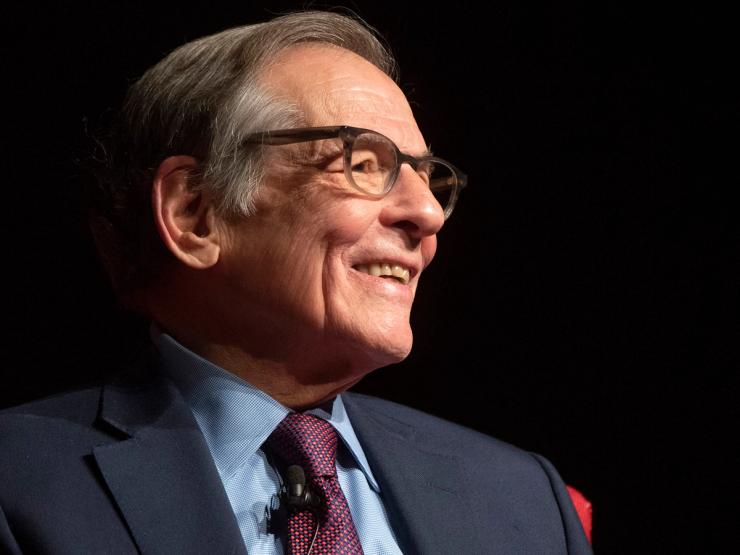The News
Every election prompts months of media handwringing — which tweet, which interview, which embarrassing question really made them hate us this time?
In a new book, Why Nothing Works, the author Marc Dunkelman goes a bit further into history to pinpoint where American media lost its way — and lands on the glorious summer of 1974, when the Washington Post took down Richard Nixon and the New Yorker published four parts of a monumental biography of New York’s great builder, Robert Moses. And his media villain is a man Dunkelman described to me as “Abbie Hoffman in a tweed suit”: Robert Caro, the revered, now 89-year old author of The Power Broker who is now working on the fifth volume of his biography of President Lyndon Johnson.
The 1,246-page Power Broker is a legend of American biography, and sits on the shelves of most journalists. (Mine, I noticed this week, was leaning dangerously toward the sofa, and so I moved it and weighed it — 3 pounds, 3 ounces by my kitchen scale.)
By the time I read it in the late 1990s, it was received wisdom — detached from any time and place, and from any sense that it advanced a political agenda. It was both a brilliant exploration of the inner workings of mid-20th century government power and a cautionary tale of how The Establishment used that power to drive highways through neighborhoods, replace “slums” with apartment buildings, and, well, build a lot of very nice parks.
Dunkelman puts the book back into context: “When, during the Watergate summer of 1974, Robert Caro published his voluminous takedown of Robert Moses, the spellbinding narrative mirrored what was, nay then, an entirely familiar worldview. Moses had been a progressive … a man who believed unerringly in the wisdom of experts,” he writes. The exposé, “released within weeks of Nixon’s resignation, was yet more evidence of power gone awry.”
Earlier journalists had “made a practice of taking public officials at their word.” (Muckrakers, like the consequential Jack Anderson, who broke much of the Watergate story but has largely been erased from its high-minded history, were confined to the margins as problematic gossip-mongers.) But there had been a cultural change: “Boomers entering the news business in the 1960s weren’t inclined to accept government claims so uncritically, and for good reason.”
Dunkelman argues that Watergate, and The Power Broker, embodied a new sort of negative naivete: a reflexive skepticism of the use of power. The role of journalism became, as you’ll often hear, to hold power to account — hardly to celebrate its successes, or even to recognize them. “The individual has to yield in matters of this kind to the entire country, to the advantages and needs of the majority of the people,” Moses protested, after people stopped listening to him. “If not, we wouldn’t build anything!”
Caro didn’t respond to an email inquiry about Dunkelman’s line on him, or the broader reconsideration of Moses.
In this article:
Know More
Dunkelman’s book captures a rising tide in Democratic politics that sometimes goes under the “YIMBY” (“yes in my backyard”) heading.
This pro-growth liberalism has been brewing for years. The blogger Matt Yglesias proposed in One Billion Americans in 2020 that the United States dominate its global competitors by tripling its population, a premise that was (obviously) not immediately embraced by either political party. A wing of the Democratic Party, beginning in San Francisco, has made a crusade of killing restrictive zoning regulations, sometimes pushing conservatives skeptical of an influx of big buildings into opposing growth in favor of a regulatory state.
The case has continued to develop, though, and its proponents are trying out a new label: the “abundance agenda.” Ezra Klein’s and Derek Thompson’s much-anticipated new book Abundance is likely to focus the conversation around these arguments this spring. They make the case that a successful Democratic Party — and its cities — must rally around an idea of a future in which the price of housing falls as the quality rises as it has for consumer goods like flatscreen TVs. And they argue that Democrats’ doctrinaire insistence on restraining the private sector in the first instance — through a blind embrace of regulations on business and technology — has cost them the ability to govern.
Ben’s view
Dunkelman came to this subject in a familiar way: reading The Power Broker as he took the train into New York City, and disembarked in Penn Station. “I would close the book, gather my belongings, and climb up into the daylight through the dingy, fetid basement corridors that serve as the city’s front door,” he recalls.
My weekly trips to Washington take me through the gorgeous, airy Moynihan Train Hall, jammed to completion by former Gov. Andrew Cuomo. (The media coverage of its opening was mixed. Architecture critics called it “glorious” and “stunning.” “Homeless feel unwelcome” without benches to sleep on, The City reported. The New York Post broke the news that the pressure of finishing the project had contributed to an executive’s suicide.)
New York’s government is, again, at a low, and a mayor’s race is underway. Cuomo is likely to run, and he’s long expressed a theory of government that harkens back to the progressive era: that in an age of public distrust, the best way to restore faith is to build and fix big, literal, public works — Moynihan, La Guardia Airport, the former Tappan Zee Bridge, now named after his father. I asked him last week about whether New York should reclaim the title of the biggest building in the world: “Al Smith, [in the] midst of the Depression, [built] the Empire State building in one year. Yes, we can.”
A Brooklyn state senator, Zellnor Myrie, is running as the YIMBY candidate, proposing that the city put 85,000 apartments in whole “new neighborhoods,” part of a plan for a million new homes that could add millions in population. He’d also like the height title back: “We shouldn’t be beat by Dubai,” he told the New York Editorial Board, of which I’m a member, Thursday. “New Yorkers just like to be inspired.”
Is it the job of the media to cheerlead such things, which bring — as Moses said — terrible tradeoffs? Generations of journalists would tell you: absolutely not. I suppose that’s why the tallest building in the world is in Dubai, where they don’t have these problems.
Room for Disagreement
Moses was the embodiment and the arm of The Establishment. We live at a moment when all politics is populism and the public consensus is to tear down the elites, the Niskanen Center’s Soren Dayton notes, while the original progressives were focused on crushing urban machines and putting power in the hands of wiser leaders.
“In a re-celebration of Robert Moses and the [Tennessee Valley Authority], you blow past public participation and celebrate a technocratic depoliticization. And, again, these same people explicitly tried to drive down public participation,” he wrote on X. “Does that sound like a match for today?”
Notable
- Caro’s introduction to The Power Broker can be read online, with this epigraph from Sophocles: “One must wait until the evening to see how splendid the day has been.”
- “The author and publisher do not comprehend the obligations of leadership,” Moses wrote in his typewritten 23-page response to the book’s four-part New Yorker excerpts.
- “The United States of the 21st century is in desperate need of new power brokers,” Ross Barkan wrote in the New York Times last year.
- Nicole Gelinas recently reconsidered Moses’s legacy for City Journal, and found him a less sinister — and monumental — figure: “Moses survived not through Machiavellian machinations to subvert political will but by smoothly delivering what the state and city’s governing class, business leaders, and editorial boards wanted him to accomplish.”
- What is American journalism if it isn’t focused on holding power to account, our profession’s loose and perhaps self-important mission in recent decades? President Theodore Roosevelt raised that question back in 1906. “The men with the muck-rakes are often indispensable to the well-being of society; but only if they know when to stop raking the muck, and to look upward to the celestial crown above them, to the crown of worthy endeavor,” he said.


